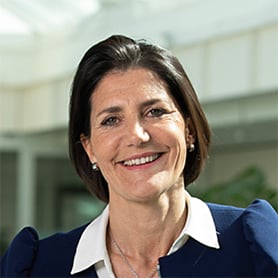Clara Millard-Dereudre: Pivoting Existing Solutions To Meet New Business Goals
As an executive director, Smart City at Services Industriels de Genève (SIG), a company that is committed to developing a sustainable and connected society, Clara Millard-Dereudre understands the value of public-private partnerships to help create a more sustainable living environment. She talks to dss+ about how caring for the environment and having a belief in actionable progress are key sustainability enablers and why one plus one should always equal three.


Clara Millard-Dereudre
Executive director, Smart City at Services Industriels de Genève (SIG)
Q.
What fundamental values have influenced your career path and how do they link to your interest in sustainable development?
We have values that we live by, such as respect and justice, but other values help us to move forward. Having been raised on a farm, I’ve always valued the importance of nature. So a core guiding value for me is respecting and living in harmony with nature and each other. A second value is around community and taking inspiration from the power of diversity and collective intelligence to inspire and energise. Collaboration is part of my management style; I firmly believe that one plus one equals three, in that when people work together they can achieve much more. Looking back at my past, this comes from the fact that I’ve constantly been exposed to different cultures and industries across my career, from the textile industry in Ethiopia, micro-electronics in Asia to agricultural science in North America. I also believe in the value of progress, where ideas move into actions. It’s not enough for me to have a vision; there must be a pragmatic outcome. All three values - respect for nature, community and progress - are fundamental to sustainable development.
"I firmly believe that one plus one equals three, in that when people work together they can achieve much more."
– Clara Millard-Dereudre, Executive director, Smart City at Services Industriels de Genève (SIG)
Q.
How can we reboot business to help us reach sustainable development goals?
There have been two tipping points in my career where I’ve realised that we need to rethink business models to meet sustainable development goals. The first is when working in the agricultural science sector, where there is the challenge of feeding a growing global population. At the same time, arable land is diminishing due to rapid urbanisation or desertification and pressure towards less use of chemical pesticides is increasing. So how can business change to support this challenge? The second light bulb moment came when, as global marketing and business sustainability director in the industrial sector, I was part of the global corporate commercial leadership team representing those functions. It became apparent to me that the role of marketing needed to evolve away from its strong focus on highlighting performance or simply selling products and services to having a more holistic purpose. So also using marketing as a tool for value chain and broader systemic collaborations, involving the end users and developing public-private partnerships. Marketing can also be repurposed to advance more sustainable solutions and engage a much wider audience. We need to encourage organisations to look beyond their original remit if we want to deliver on sustainable development goals.
Q.
Leadership is an essential aspect of changing how business meets sustainability challenges. How can style improve the chances of success?
First, leadership needs a strong sense of being human and how that links with the natural world. This is central to developing a sustainable strategy. In addition, leadership style must be visionary, yet also underpinned by a pragmatic approach that moves from words to actions to enable the transition. In this respect, purpose to the message behind the strategy is vital as a focus on positive impacts can help to energise people and move things forward. A collaborative style is a further attribute. Sustainability requires a systemic approach, and you cannot be systemic if you don’t have a mindset of being collaborative and inclusive. Consistency is also important. Talking about sustainability but not putting it into action leads to greenwashing. So leadership needs to ensure there is consistency in sustainability messaging that is matched by company actions. The good news is that some of these leadership styles are beginning to shine through.
"Technology is an obvious trend, but it’s not always about new or disruptive technology. Being innovative with existing technology should not be overlooked."
– Clara Millard-Dereudre, Executive director, Smart City at Services Industriels de Genève (SIG)
Q.
Are you seeing any other trends in how companies are taking on sustainability challenges?
An exciting trend is a growth in the popularity of mission-led companies where sustainability is the foundation for the business model. So products are designed with their whole life cycle in mind, rather than ending once the product has been sold. Companies going down this pathway can also get certification that tracks sustainability progress. Technology is an obvious trend, but it’s not always about new or disruptive technology. Being innovative with existing technology should not be overlooked. For example, at Smart City, we use existing artificial intelligence (AI) solutions for our energy management systems. Data gathered helps us integrate renewable energy into the mix as and when it becomes available. Another simple technology solution is creating digital platforms to improve the circular economy. We have developed one called Re-sources, whereby used equipment is put online and companies can take them for free. These are all step changes that use existing technology more innovatively. Of course, new and amazing technology is also being developed to fill gaps where new solutions are required. One used at Smart City is 3D and digital twins data that looks below, on and above the ground to predict and optimise energy usage for a whole district. It’s about striking a balance between developing new technology and also looking at existing technology that can be repurposed to create a new solution.
Q.
What do you now see as the challenges ahead for reaching a more sustainable future?
On any sustainability journey, you must bring people in the company along with you. At a practical level, this is not always easy as you are often dealing with very different areas of the business with varying priorities, including more mature departments to development functions. But it’s vital that you work out points and areas of engagement so that what you are trying to achieve on sustainability is aligned across the whole business ecosystem. Then it’s a question of looking outside company walls. Who can you partner with? Who is the end user and what role do they play? For us at Smart City, that’s about putting the citizen at the centre of everything we do. A further challenge is using technology and data responsibly and ethically. Technology is a vital enabler, but digital emissions are a growing part of the problem. So we must ensure we are not creating digital solutions without considering the consequences. We also need to build more trust in how we use data which is paramount for reaching sustainability goals. Thankfully more data regulations are now in play, but it’s only by creating a bond of trust that people will feel happy giving their data freely. In this respect, there must be transparency and consistency in using that data. If people can see that your actions match your promises on data use, they will trust you. Again, it’s about being consistent.
Q.
What would be your personal and business drivers for helping us become more sustainable?
On a personal level, we have to focus on the next generation. Humans can achieve amazing things, but we must be careful that future progress doesn’t destroy our natural environment. I dream of a world where humans and nature can live in harmony and everyone can enjoy the beauty of our world for the long term. From a business perspective, we need to rethink the economic system and the organisation’s role so that business becomes a more effective and proactive transformative tool both within and outside the organisation. Also, that we leverage the role of marketing to become a more proactive sustainability partner. Often, the easiest and quickest solutions are right in front of us. It’s just a question of seeing how we can pivot those solutions to meet new goals so that business becomes a force for good.
"The easiest and quickest solutions are often right in front of us. It’s just a question of seeing how we can pivot those solutions to meet new goals so that business becomes a force for good."
– Clara Millard-Dereudre, Executive director, Smart City at Services Industriels de Genève (SIG)